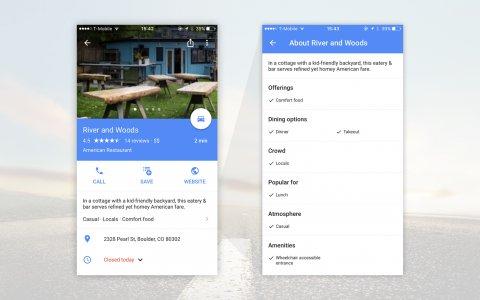A group of Google employees spent their '20% time' making Google Maps wheelchair-friendly

Google Maps is now wheelchair-friendly.
The wildly popular map app will now tell you whether locations are suitable for people with access needs — and it's thanks to a group of Googlers who worked on the feature in their "20% time."
It's a famous policy of the Californian search giant: Employees can spend 20% of their time working on other projects unrelated to their main jobs. Gmail, AdSense, and Google News all started as 20% projects. These days, Google employees need to get permission from managers to get this time, and most don't do it. Google HR boss Lazlo Bock says it has "waxed and waned" over time. But some still do — and Rio Akasaka is one of them.
By day, Akasaka is a product manager on Google Drive, the cloud file-hosting service. But in his 20% time, the Boulder, Colorado resident is a product manager working on accessibility features for Google Maps.
For the last year, he has worked with a team of contributors (between five and 10 of them, all in all) on introducing accessibility guidelines to Google Maps. The map tool already displays some information about venues and locations, like busy-ness, opening times, reviews, and atmosphere. Alongside this, it will now display information about their suitability for people with access needs.
How does Google Maps know? It sources the answers from its "Local Guides" — Google Maps users who answer questions about the places they visit on everything from cost to quietness. Earlier this year, queries on accessibility were added to the questions asked to these users, and with millions of answers, Google now feels confident enough to start displaying the results on its listings.

It looks like a small change — but if you're in a wheelchair, it's a pretty important one.
"Accessibility at Google is a big deal," Akasaka told Business Insider. "But it's often facilitated by whether or not there's a legal requirement, or some sort of requirement we need to adhere to." (There are standardised guidelines on how text should be rendered on the web to ensure it's legible, for example — but frustratingly, they are not always adhered to.)
But there are no rules governing accessibility requirements for mapping software, forcing Akasaka and his team to be more proactive.
The feature won't just help people in wheelchairs, either. The product manager cites parents with prams, or people reliant on canes, as people who will benefit from more information about a building's facilities.
"Google’s mission is to organise the world’s information and make it universally accessible and useful," the company boasts. Akasaka says he wants to make sure that "even those with access needs" benefit from this.
Read more:
• This chart is easy to interpret: It says we're screwed
• How Uber became the world's most valuable startup
• These 4 things could trigger the next crisis in Europe
Read the original article on Business Insider UK. © 2016. Follow Business Insider UK on Twitter.
Join our commenting forum
Join thought-provoking conversations, follow other Independent readers and see their replies
Comments
Bookmark popover
Removed from bookmarks